Communications Minister Michele Rowland confirms age limits for kids on social media
The Albanese government says it’s holding ‘big tech to account’ and age limits for kids on social media are the first step.
Social
Don't miss out on the headlines from Social. Followed categories will be added to My News.
Age limits for Australian children and teenagers accessing social media are locked in, the federal government has confirmed, in a world-first push to roll back the power and influence of big tech.
Communications Minister Michele Rowland, speaking in Adelaide on day two of a summit on social media, said her government was not afraid to hold “big tech to account”.
Age verification for digital platforms such as Instagram, TikTok and Snapchat would constitute one part of a broader reform package to limit online harms to children in the smartphone age.
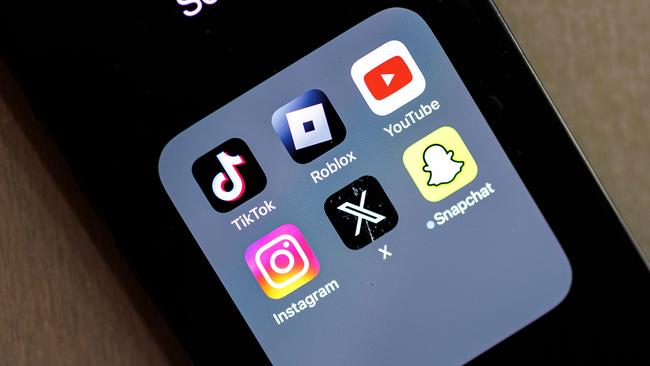
“As parents, we also worry our children may unintentionally access harmful, distressing and age-inappropriate content on their feeds,” she said.
“We know that almost two-thirds of 14- to 17 year-olds have viewed extremely harmful content online including drug abuse, suicide or self-harm, as well as violent and gory material.
“A quarter have been exposed to content promoting unsafe eating habits.
“This is unacceptable and must be addressed.”
She said the Albanese government had written to state premiers and chief ministers for their input on the proper age limit.
“No solution will be perfect and consensus on the ‘right’ age is unlikely,” she said.
“Young people are digitally savvy and will find ways to circumvent controls.
“But we can’t let the ‘perfect’ be the enemy of good – we need to make progress to ensure our safeguards keep improving.
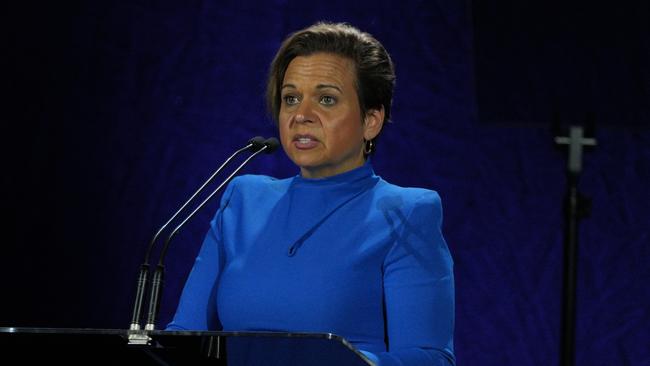
“Establishing an age limit for social media will help signal a set of normative values that support parents, teachers, and society more broadly.”
Ms Rowland also said legislation tackling social media harms, expected in parliament later this year, would place the onus on platforms, not parents or young people, to protect children “at the source”.
“It will be incumbent on the platforms to demonstrate they are taking reasonable steps to ensure fundamental protections are in place at the source,” she said.
“Our approach will ensure the eSafety regulator provides oversight and enforcement.
“We are also considering an exemption framework to accommodate access for social media services that demonstrate a low risk of harm to children.
“The aim of an exemption is to create positive incentives for digital platforms to develop age-appropriate versions of their apps, and embed safe and healthy experiences by design.
“We are conscious of the harmful features in the design of platforms that drive addictive behaviours.
“This is why we will set parameters to guide platforms in designing social media that allows connections, but not harms, to flourish.”
The government will give companies 12 months to comply with the new regulations.
ASIO Warns ‘Two Clicks Is All It Takes’
Speaking before Ms Rowland, ASIO chief Mike Burgess said social media was both a “goldmine and a cesspit”, a force simultaneously “social and anti social”.
“Based on what I see at ASIO, the internet is the world’s most potent incubator of extremism and social media is the world’s most potent accelerator of that extremism,” he said.
“No form of tech, no corner of the internet, should be above the rule of law.
“Social media cannot be without social license.”
Mr Burgess warned the security climate had moved to a zone where violence was becoming “more permissible”.
“Social media is not the sole driver of these trends, but ASIO considers it a significant driver,” he said.
“Social media allows extremist ideologies, conspiracies, mis- and disinformation to be shared at an unprecedented scale and speed.
“Social media helps extremists find and build relationships with other extremists more quickly, easily and securely.”
He said access to extremist content was only ever a “few clicks” away in the online world.
“Let me give you a real world of the online journey,” he said.
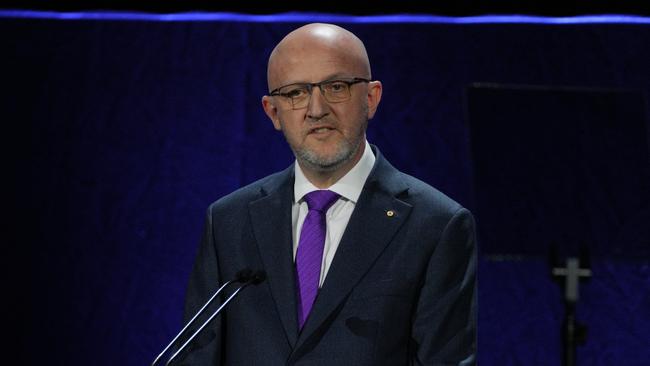
“Users of a very popular social media platform can visit a page administered by individuals who subscribe to a radically hard-line religious interpretation.
“The page espouses strong views but does not advocate violence, hate speech or terrorism.
“Once you visit the page, the algorithm recommends similar pages it thinks you will like.
“If you go to one of the recommended pages, you’re encouraged to join an English-language Telegram network.
“The Telegram network is explicitly pro-ISIL, containing propaganda videos, messages of support for Australian terrorists, statements justifying, and I quote, ‘spilling the blood.’
“Two clicks is all it takes to go from the radical to the violent and extreme.
“Guided by an algorithm that thinks it is being helpful.”
Mr Burgess also warned some 20 per cent of priority counter-terrorism cases now involved minors.
“As a nation, we need to reflect on why some young teenagers are hanging Nazi flags or portraits of the Christchurch killer on their bedroom walls and why others are sharing beheading videos in the schoolyard,” he said.
“When ASIO and law enforcement are dealing with this problem, it is usually too late.”
He said tech companies were “smart” and “rich” and were capable of building AI tools to moderate and remove extremist material.
‘You Better Effing Do Something’
South Australian Premier Peter Malinauskas has revealed his wife pushed him to consider a ban on social media for kids, telling him one night that “you better effing do something about this”.
Mr Malinauskas helped trigger a national conversation on social media’s dire effects on children after launching a state-based proposal to implement age verification for digital platforms.
Speaking at the Adelaide Convention Centre on Friday, Mr Malinauskas said his wife Annabel had grown alarmed about children locked in to social media after reading The Anxious Generation, which charts the destructive effects of tech on childhood development, by leading US social psychologist Jonathan Haidt.
“Bell read the book The Anxious Generation … she read the book and turned to me one night and said, ‘you better effing do something about this’.”
“That sincerely was the genesis of actually putting our minds to what can we do as a state government in conjunction with the state parliament to make a difference.”
Australia is moving towards legislation that will compel tech giants like Snapchat, Meta and TikTok to implement age verification, with South Australia first proposing the idea of an age ban that was then picked up by the federal government.
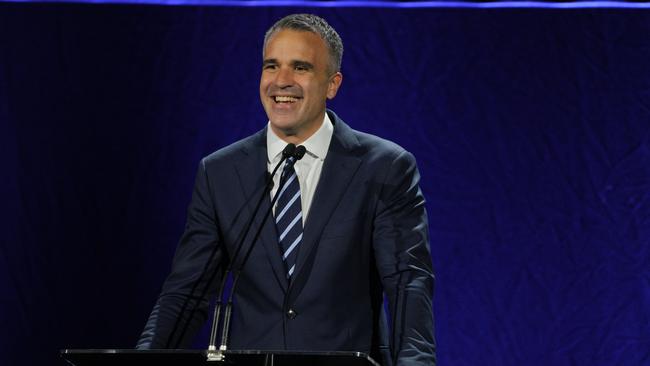
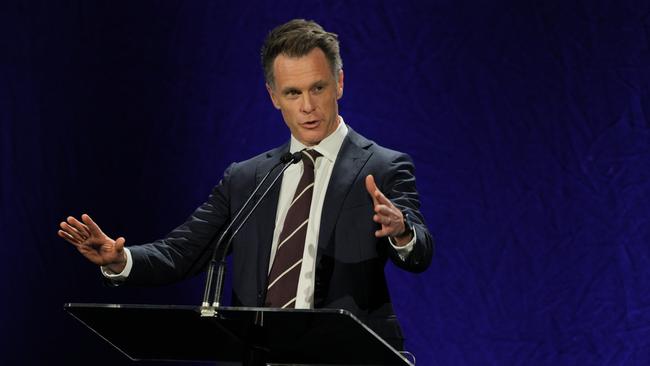
Mr Malinauskas is holding a two-day Social Media Summit alongside NSW Premier Chris Minns, with day 1 in Sydney and day 2 in Adelaide.
“Let’s not minimise the stakes here … the eyes of the world are actually on us in regards to this reform,” Mr Malinauskas said.
“We will embolden other governments around the world to follow our example.”
Mr Malinauskas said from next year, South Australian public and private schools would roll out special social media training courses to help students deal with potential harms, including sextortion and image-based abuse.
Young Aussies Speak Up
A panel of teens drawn from The Adelaide Advertiser’s annual Teen parliament exposed the stark abuse Australian children are subjected to on social media.
One speaker said she started using social media at the age of 11 and had been sexually harassed online at the age of 12.
“We don’t know what to do when those things happen,” she said.
Another told attendees social media could deliver some positive benefits to teens, particularly around social connection.
“That can be a real positive … but it means you’re never switched off,” she said.
But she warned smartphones and social media had become “habits” rather than choices for many children and teens.
“It’s just every day you wake up and the first thing is you reach for the phone,” she said.
Mr Haidt, dialling into the summit, called on Australian legislators to “clean up” the mess America had made for the world.
He said social media had helped contribute to “the greatest destruction of human capital and capacity in human history” outside of World War II, citing global declines in educational outcomes and the ability of children to focus and concentrate since the ascension of smartphones and social media.
Mr Haidt proposed the reinstitution of four key “norms” to save childhood development: no smartphones before 14, no social media before 16, phone-free schools and more independence and free play for children.
Originally published as Communications Minister Michele Rowland confirms age limits for kids on social media


